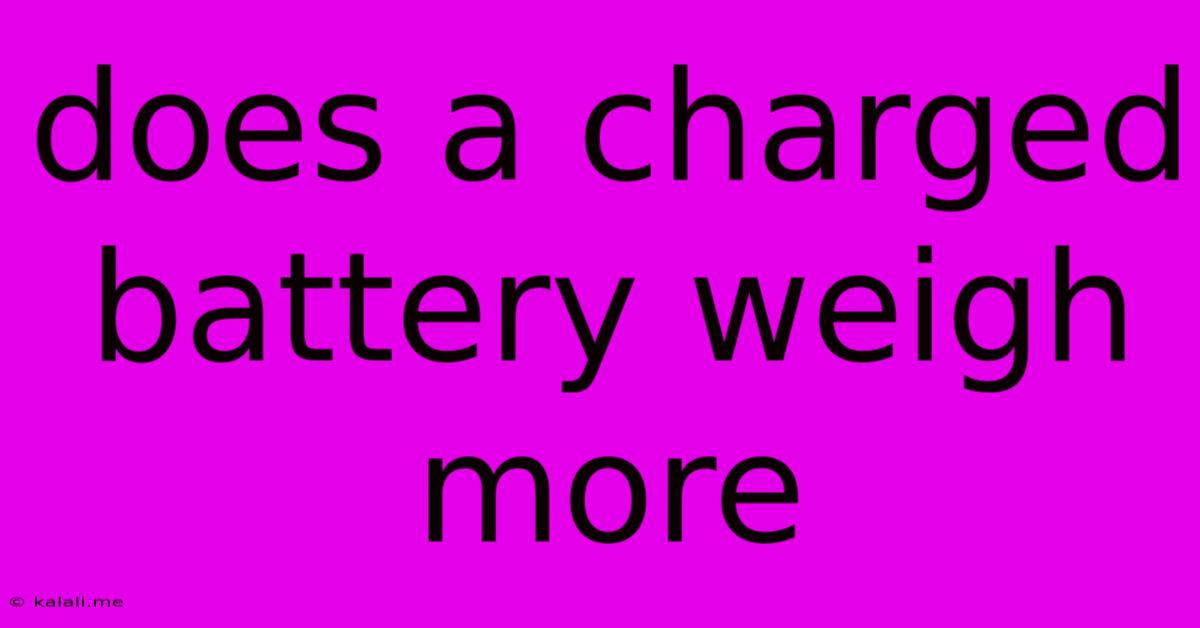Does A Charged Battery Weigh More
Kalali
Jun 08, 2025 · 3 min read

Table of Contents
Does a Charged Battery Weigh More? Exploring the Physics of Mass-Energy Equivalence
Have you ever wondered if a charged battery weighs more than a discharged one? The short answer is: yes, but the difference is incredibly tiny and practically immeasurable. This seemingly simple question delves into the fascinating world of Einstein's famous equation, E=mc², and the relationship between mass and energy.
This article will explore the physics behind this phenomenon, explain why the weight difference is so minuscule, and debunk some common misconceptions. We'll also touch upon the practical implications and why this concept, while scientifically accurate, isn't something you need to worry about in everyday life.
Understanding Mass-Energy Equivalence (E=mc²)
Einstein's theory of special relativity postulates that mass and energy are equivalent and interchangeable. The equation E=mc² shows that energy (E) is equal to mass (m) multiplied by the speed of light (c) squared. This means a small amount of mass can be converted into a tremendous amount of energy, and vice versa.
In the context of a battery, the charging process involves storing electrical potential energy. This energy, according to E=mc², represents a tiny increase in mass. When the battery discharges, this energy is released, and the mass decreases correspondingly.
Why the Weight Difference is Immeasurably Small
While the principle is sound, the actual weight difference is practically undetectable. This is because the speed of light (c) is an astronomically large number (approximately 3 x 10⁸ m/s). Squaring this already enormous number results in an incredibly large multiplier. Even a significant amount of electrical energy stored in a battery translates to an incredibly minuscule increase in mass. We're talking about a difference in weight that's far beyond the capabilities of even the most sensitive scales.
Consider this: a typical AA battery might store a few watt-hours of energy. Converting this energy to mass using E=mc² would yield a mass increase on the order of nanograms, a billionth of a gram. This is far too small to be measured with current technology.
Debunking Misconceptions
Some people mistakenly believe the added weight comes from the influx of electrons during charging. While electrons do flow into the battery, their mass contribution is negligible compared to the mass-energy equivalence effect described above. The weight increase is primarily due to the increase in potential energy stored within the battery's chemical structure.
Practical Implications
While the weight difference is scientifically interesting, it has no practical implications in everyday life. You don't need to worry about your charged batteries being heavier and affecting the weight of your luggage or devices. The difference is simply too insignificant to be of any concern.
Conclusion
A charged battery does indeed weigh slightly more than a discharged one due to the mass-energy equivalence principle. However, this difference is incredibly small and practically immeasurable with current technology. This concept serves as a fascinating illustration of Einstein's famous equation and the interconnectedness of mass and energy, but it's not something to worry about in your daily routine. The weight increase is far too minuscule to have any discernible impact.
Latest Posts
Latest Posts
-
Today Is A Good Day To Die
Jun 09, 2025
-
They Said I Have To Def
Jun 09, 2025
-
What Is The Color Brown In Spanish
Jun 09, 2025
-
Python Attempted Relative Import With No Known Parent Package
Jun 09, 2025
-
This Page Intentionally Left Blank Paradox
Jun 09, 2025
Related Post
Thank you for visiting our website which covers about Does A Charged Battery Weigh More . We hope the information provided has been useful to you. Feel free to contact us if you have any questions or need further assistance. See you next time and don't miss to bookmark.